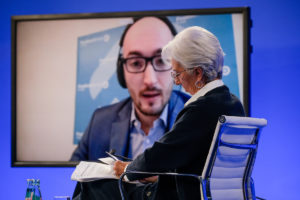ECB must add quality to quantity – remarks at ECB Listens

On 21 October 2020, the European Central Bank organised its very first exchange of views with civil society organisations. At this occasion, I had the opportunity to address the ECB President Christine Lagarde and chief economist Philip R. Lane.
This work was carried out in the context of my former role as Executive Director at Positive Money Europe.
Here are the full remarks I made on behalf of Positive Money Europe during the “ECB Listens” event:
As external observers, we are extremely concerned that old-fashioned central banking theory does not seem to be working anymore. For example, the ECB has failed at achieving its inflation mandate for the past six years, bringing the robustness of the economic theory which the bank relies upon into question. The current pandemic crisis only reinforces this paradigm shift and brings even more uncertainty.
The ECB’s strategic review offers an opportunity to explore better ways for the bank to achieve its mandate. We broadly agree with Mr Lane’s description of the price stability mandate. However, whatever price stability target the ECB chooses, the ECB will not achieve it unless it is using the right tools.
First, the ECB must add quality to quantity. Currently, the ECB is using blunt tools such as “quantitative easing”, where the ECB injects trillions of euros into financial markets in the hope that banks will do their job.
These quantitative easing programmes seem rather ineffective in proportion to their size. Does a small reduction of the yields by 20 to 40 basis points economically justify the injection of €3 trillion in asset purchases? How about the fact that liquidity provided by the ECB often ends up subsidising fossil fuel companies or multinationals’ share buyback operations, directly benefiting the 1 percent. Is this really the best way of conducting monetary policy?
Instead of always creating more money, the ECB must start looking at the quality of the financial flows that its policies directly or indirectly generate. From that viewpoint, we welcome the current debate on the role of the ECB in fighting climate change, and we expect this debate to lead to ambitious policy changes.
We also hope this is only the beginning of a deeper reflection on how money creation currently works.
Today, the ECB is totally dependent on banks and financial markets to transmit its monetary policy. This works well in theory, but not so much when markets fail or when people simply cannot afford more debt. Instead, central banks could cut the middleman by adopting what we call “Quantitative easing for the People”, or “helicopter money”, distributing money directly to citizens.
It is really shocking that the ECB has not yet looked at this policy option, and not even made any research publications on this, while the rest of the world is debating it intensively.
In response, Phillip Lane expressed his “sympathy” for this criticism and vaguely alluded to technological possibilities in this respect (I assume he meant the possibility of introducing a digital euro).
The full event can be watched here and a written summary is also available on the ECB’s website.
This post is also available in: French
